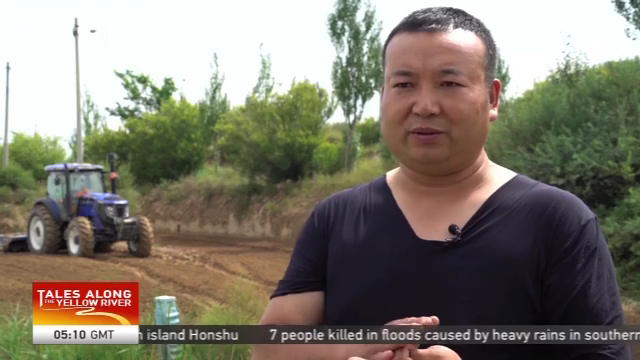
21:20, 29-Aug-2019
Restoring the Loess Plateau: Human-land harmony helps alleviate poverty in historically destitute Xihaigu
Updated
22:27, 29-Aug-2019

Wang Shifeng still remembers the days when he couldn't even feed his own family with what he grows.
This village, located in the west of China's Loess Plateau, was part of a region historically known as "Xihaigu", a combined name for several extremely impoverished counties in southern Ningxia.
Thousands of years of cultivation, compounded by the powdery nature of the soil, had led to severe erosion of an already barren land. Poverty, as a result, was widespread.
WANG SHIFENG, FARMER BAOSHAN VILLAGE, NINGXIA HUI AUTONOMOUS REGION "It was difficult to access water, to go outside. And before the terraces were built, the fields were too steep to plough with a cow. Everything was difficult."
For Wang's family, those hardships are now memories. And although by today's standards of an average Chinese household, they still lead a quite simple life, the 45-year-old is grateful for the changes.
WANG SHIFENG, FARMER BAOSHAN VILLAGE, NINGXIA HUI AUTONOMOUS REGION "Previously it was all slope fields. The earth was not moved, and the land didn't yield much. Now it's all terrace fields and the water doesn't escape anymore. The land yields a lot more."
Since the 1980s, as part of a grand project to rehabilitate the heavily eroded loess plateau, a government-led initiative to terrace the sides of the ravines and plant trees in the local county continues to this day.
XU MENGQI GU YUAN, NINGXIA HUI AUTONOMOUS REGION "It's hard to imagine that 40 years ago, where I'm now standing was designated by the United Nations as one of the world's least habitable areas for humans. The ecological restoration was a massive undertaking. It has involved not only engineering work, such as the terracing here, but also the migration and relocation of the local people."
In Wang's village, more than half the population has either left to seek opportunities in cities or signed up for a relocation package from the government.
A great number have also lended their land to Zhang Guangzhi, owner of a company that grows traditional Chinese medicinal herbs.
ZHANG GUANGZHI, CEO NINGXIA TIANCHENG CHINESE MEDICINE TECHNOLOGY DEVELOPMENT CO., LTD "About half the land we rented was actually deserted, because young people left to work elsewhere. Now by lending the land to us they can earn rent and if there is extra labor, they can work for us and earn two incomes at once."
Near Zhang's herb farm, I met another villager, who instead of toiling the farmland, has switched to beekeeping, which for him generates more income.
As I followed the bees to the flowering shrubs where they extract their nectar, I suddenly realized without the greening efforts over the decades, none of these would exist.
For the people of Xihaigu, as the balance between life and land tips towards harmony here, their collective memories of bitterness are also fading.
XMQ, CGTN, Guyuan, Ningxia.
SITEMAP
Copyright © 2018 CGTN. Beijing ICP prepared NO.16065310-3
Copyright © 2018 CGTN. Beijing ICP prepared NO.16065310-3